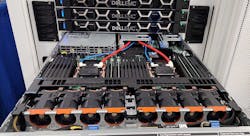DOE Provides $40 Million to Advance New Approaches to Data Center Cooling
Fifteen vendors and university labs have been selected to take the first steps under COOLERCHIPS, an ambitious government program to cut data center power usage for cooling to 5% of their total energy consumption.
The Department of Energy's Advanced Research projects Agency – Energy (ARPA-E) is providing $40 million in funding to jumpstart a program called COOLERCHIPS - an acronym for Cooling Operations Optimized for Leaps in Energy, Reliability, and Carbon Hyperefficiency for Information Processing Systems.
The program aims to develop the next generation of energy efficient and reliable cooling technologies for data centers. The goal is to reduce energy consumption for cooling IT workloads in data centers from the 30%-40% currently found in most facilities to 5% of the data center’s energy consumption.
U.S. Secretary of Energy Jennifer M. Granholm says the motivation behind the program is addressing issues such as the severe weather events that can threaten the functionality of data centers, often brought on by climate change. “The DOE is funding projects that will ensure the continued operation of these facilities while reducing the associated carbon emissions to beat climate change and reach our clean energy future,” said Granholm.
The DOE funding arrives as data center operators are preparing for a new generation of powerful IT hardware that will do more data-crunching but also use more electricity.
With individual project funding ranging from $1.2 million to $5 million, the 15 recipients are pursuing a variety of cooling technologies, ranging from reimagining the modular data center to new approaches to cold plate technologies.
Here's a look at the national labs, universities, and businesses receiving funding:
Nvidia Corporation – Santa Clara, CA
Green Refrigerant Compact Hybrid System for Ultra-Efficient and Sustainable HPC Cooling - $5,000,000
Nvidia will develop a novel modular datacenter with a cooling system that combines direct-to-chip, pumped two-phase and single-phase immersion in a rack manifold with built-in pumps and a liquid-vapor separator. The design cools chips with a two-phase cold plate, while the rest of the server components with lower power density will be submerged inside a hermetically sealed immersion sled with the servers cooled using green refrigerants for the two-phase cooling and dielectric fluid for the immersion. The two-phase porous metal cold plate will achieve a thermal resistance as low as 0.0025°C/W.
University of California, Davis – Davis, CA
Holistic Modular Energy-efficient Directed Cooling Solutions (HoMEDiCS) for Edge Computing - $3,586,473
The University of California, Davis, will develop a suite of holistic thermal management solutions for modular datacenters used for edge computing. Their design innovations include efficient heat extraction from CPU and GPU chips with a liquid-cooled loop and use of high-efficiency, low-cost heat exchangers. Auxiliary electronics in the server boards would be cooled with a secondary loop that rejects heat to the atmosphere.
Flexnode – Bethesda, MD
Prefab Modular Liquid-cooled Micro Data Center - $3,500,000
Flexnode will develop a prefabricated, modularly-designed edge data center that will leverage four key component and system-level technology advancements: a novel manifold microchannel heatsink, a chassis-based hybrid immersion cooling approach, a cost-effective additive manufacturing-enabled dry cooling heat exchanger system, and a topology optimized container housing the entire system.
University of Maryland – College Park, MD
Multi-Objective Optimization Software for COOLERCHIPS - $3,484,484
The University of Maryland will develop an integrated decision support software tool for the design of next-generation data centers that seamlessly links the existing open-source software for modeling reliability, energy, carbon footprint, and cost with an innovative co-simulation framework. This tool will permit data center designers to develop transformational and disruptive design advances compared to existing state-of-the-art technologies.
HP – Corvallis, OR
Embedded Microfluidic Cooling for Nextgen High Power Server Architectures - $3,250,000
As part of their Category A effort, HP will work with partners to develop an aggressive liquid cooling solution that reduces the need for thermal interface material and the number of thermal interfaces between high-power CPUs/GPUs and the coolant, thereby dramatically lowering the package thermal resistance. The proposed approach leverages HP’s inkjet microfluidics platform and relies on first coupling silicon microchannels to a device’s surface, and then by embedding microfluidics deeper into the device as a future step. This design would reject server heat to 40°C and 60% relative humidity external ambient air.
University of Florida – Gainesville, FL
Hyperefficient Data Centers for Deep Decarbonization of Large-Scale Computing - $3,042,417
The University of Florida is developing a disruptive thermal management solution proposed for cooling future CPU and GPU chips at unprecedented heat flux and power levels in data center server racks. The new technology allows for significant future growth in processor power, rejects heat directly to the ambient air external to the data center, and would facilitate adoption within the existing data center infrastructure with a primary liquid cooling loop.
University of Texas at Arlington – Arlington, TX
Holistic Co-Design of Novel Hybrid Cooling Technology for the Data Center of the Future- $2,843,223
The University of Texas at Arlington and collaborators will develop a novel hybrid cooling technology to address the growing need for advanced thermal management solutions for high-power data centers. At the server level, the design combines direct-to-chip evaporative cooling module including electrodeposition of metal on high-powered devices to eliminate thermal interface materials and to reduce chip-to-coolant thermal resistance, and air cooling including Rear Door Heat Exchanger for the rest of the system and thus enabling a robust and extendible solution for the future as well as an easy path to retrofit legacy data centers.
Raytheon Technologies Research Center – East Hartford, CT
Extra Efficient Data Centers Using Avionics Cooling Technology - $2,504,024
Raytheon Technologies Research Center will develop Extra Efficient Data Centers with Avionics Cooling Technology (EXTRACT) with a cross-industry collaborative team. Targeted heat removal from high-power processors will be achieved with Ribbon Oscillating Heat Pipes (RHPs). Heat is extracted from servers with integrated, passive, and reliable heat spreading. The RHP technology, with record-low thermal resistance, could enable a transformational reduction in the power consumption of future data centers.
University of Illinois at Urbana-Champaign – Champaign, IL
Holistic Rack-to-Processor Power and Thermal Co-Design for Future Servers - $2,500,000
The University of Illinois at Urbana-Champaign will develop an innovative cooling paradigm capable of both minimal energy use and maximum cooling power for future servers. Their design integrates high-performance thermal interface materials, coefficient of thermal expansion matched and reliable silicon carbide coolers, topology optimization-based design automation coupled with silicon carbide additive manufacturing, robust and cost-effective single-phase water cooling, and high primary-side temperatures to enable efficient heat dissipation to the ambient.
HRL Laboratories – Malibu, CA
Aligned Graphite Microchannel Cooling (AGMC) System with Additively Manufactured Manifolds - $2,000,000
As part of a Category A project, HRL Laboratories will develop a novel data center thermal management system with low thermal resistance and greater energy efficiency to reduce power consumption for the next generation of data center servers. HRL’s system utilizes aligned graphite micro-fins and additively manufactured flow manifolds to overcome performance limitations common to existing cooling blocks and provide unprecedented cooling for current and future processors.
Purdue University – West Lafayette, IN
Confined Direct Two-phase Jet Impingement Cooling with Topology Optimized Surface Engineering and Phase Separation Using Additive Manufacturing - $1,881,315
Purdue University, Binghamton University, and Seguente Inc. will develop an innovative chip-level direct two-phase impingement jet cooling solution to drastically enhance overall thermal performance while reducing pumping power. The design includes new algorithms for topology optimization of the cooling structure, novel on-chip direct printing methods for laser powder bed fusion of multi-porosity wicks, and an additively manufactured multi-input\multi-output fluid distribution manifold.
Intel Federal – Austin, TX
Enabling Two-Phase Immersion Cooling to Support High TDP - $1,711,416
Intel Federal will develop ultra-low-thermal resistance, coral-shaped immersion cooling heat sinks integrated with a 3D vapor chamber cavity for high-power devices. Intel’s design would address the challenge of adapting two-phase immersion cooling by optimizing 3D vapor chambers to spread the heat more effectively. This is paired with innovative boiling enhancement coatings to reduce thermal resistance by promoting high nucleation site density.
University of Missouri – Columbia, MO
Dual-mode Hybrid Two-phase Loop for Data Center Cooling - $1,649,290
The University of Missouri will develop a hybrid mechanical-capillary-drive two-phase loop that could serve as an ideal cooling solution for data centers. The proposed technology offers numerous advantages over existing phase-change processes such as flow boiling and condensation, including dual-mode operation, low thermal resistance, high heat flux, low pumping power consumption, high power density, reliable operation, and a fully scalable design.
National Renewable Energy Laboratory – Golden, CO
COOLERCHIPS Technical Evaluation Team - $1,463,319
The National Renewable Energy Laboratory (NREL), Sandia National Laboratories, and the Georgia Institute of Technology will develop testing protocols to evaluate the cooling technologies developed by COOLERCHIPS projects in real data center operating conditions. The scale will range from the component level to the rack level and all the way up to full edge data centers. This technical evaluation team will leverage the work done by the COOLERCHIPS Category C team to develop a digital twin to evaluate key parameters and help test a broad range of technologies developed by other COOLERCHIPS project teams to evaluate their thermal, reliability, and cost goals.
JetCool Technologies – Littleton, MA
Sub-One PUE through Silicon Cooling Efficiency - $1,265,747
JetCool will develop a microconvective cooling technology that combines and optimizes two distinct cooling approaches to provide the highest levels of energy efficiency in data centers. JetCool’s micro-convective cooling modules lower CPU temperatures, reducing leakage current and resulting in power savings of 8-10% while an in-server radiator eliminates the need for server-dedicated air cooling in the data center to provide significant additional energy savings.






